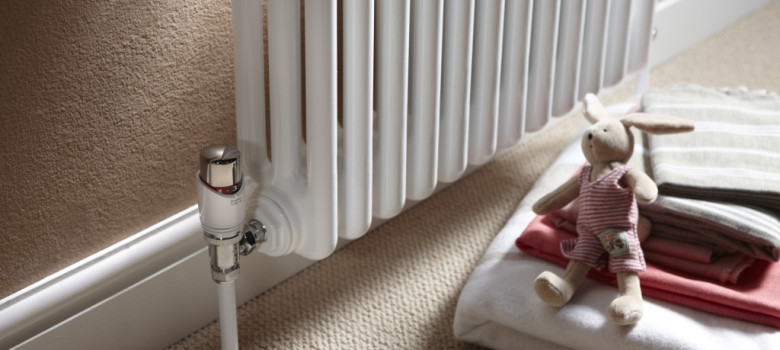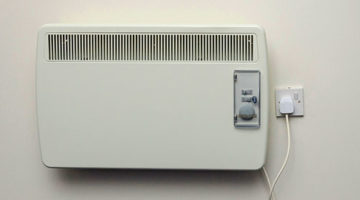
What are thermostatic radiator valves (TRVs)?
Thermostatic radiator valves are commonly referred to as TRVs and are used to control the air temperature of different rooms – you will normally find them on the side of your radiators.
TRVs are just one of a number of heating controls, which allow homeowners to heat their homes more efficiently. If set up correctly, they allow you to have different heating zones throughout the house, despite only one centralised boiler providing the heat.
How does a TRV work?
The TRV is a self-regulating valve that works by changing the flow of hot water into a radiator. It consists of two parts, the valve head and the valve body, with the head sitting atop the body. When the room temperature changes, a capsule in the valve head contracts or expands, which moves a pin in the valve body causing it either to open or close.
If it gets too warm in the room, expansion of the capsule will cause the pin to close the valve – slowing the movement of hot water into the radiator. Likewise, if the room drops in temperature, contraction of the capsule in the valve head pulls the pin out, allowing hot water to enter the radiator once more.

Costs of TRVs
A traditional TRV will cost you about £10 – 30 each.
Where not to use a TRV
There are two places that you really shouldn’t install TRVs on the radiators – the first is in bathrooms. This is because the heat produced by the bath/shower will cause the TRV to shut off (it will cause the capsule to expand), just when you need the heat from the radiator to fight off condensation.
We also don’t advise installing a TRV in the same room as your main heating thermostat. The main thermostat will link directly to the boiler, firing it up or turning it down, so by having a TRV in that room they will fight for control – if the TRV wins, the heating in your house will go off!
Smart TRVs
Nowadays you can take zonal heating control a step further with smart TRVs. These electronic TRVs are remotely controlled to constantly monitor the temperature of the room and move the pin up and down accordingly.

Are TRVs a good idea?
In properties with a decent number of different rooms, then TRVs are definitely worth considering, especially if there are rooms that are unused and therefore not worth heating in the first instance.
They can produce decent energy savings especially when part of an intelligent heating system.
It is important to maintain them though; many clients we see have non-functioning TRVs.
It is important to ensure that the valve head vents don’t get clogged by dust and other objects since this can obstruct air hitting the liquid or wax capsules that control how the TRV functions. It is also worth checking once a year that the pin in the valve body is still moving freely (these sometimes get stuck).
To do this, unscrew the valve head off the body – this should reveal the pin that moves up and down controlling the flow of water into the radiator. A spring should hold the pin fully extended above the valve – if the pin doesn’t move when you push it, you may need to replace the whole valve assembly.












i got smart TRV’s from Radmise, this system is great and includes an automatic exercise routine of the valve pin which seems to have stopped the clogging problem.
The houseTech ones are better and cheaper than those mentioned
Thanks for sharing. Really useful information
I disagree with your statement that liquid elements in TRVs are generally considered to be better than wax. It depends on the manufacturer and design. What people should be looking out for when purchasing TRVs are the approvals and ratings. An EN215 standard marking shows the product has been tested and performs to a high standard. Also the best TRVs have an A rated Tel rating, much like kitchen appliances. You don’t have to buy an expensive TRV to get these high standards, but generally the nicer looking designs cost a bit more.
I have had TRV’s fitted to all rads,(except bathroom as not done that yet) is this a bad mistake!?
No! We wouldn’t recommend installing them in the bathroom though.
One thing I could not get an answer to from the Honeywell person (who said their product goes directly on the radiator which plainly it does not) was, is the physical interface between a trv body and a trv head (of which they sell a WiFi one) always standard. Surely this is an important question. Does anyone know?
There are several different interfaces – as I found out to my cost when I replaced one!
Anyone know anything about this?
” if the TRV wins, the heating in your house will go off!”
This is not true. If the TRV switches off, it will only cut off the water supply to that radiator. Hence the room will not get any warmer and the room thermostat will still call for heat to the rest of the house.
But if the TRV near the room thermostat is set higher than the other rooms’ TRVs then surely the room thermostat will cut the heat for the whole house before the other rooms get warm enough? So the TRV near the room thermostat should be set lower than the other TRVs, right?
When built in 1979, our house was fitted with TRVs in exactly those rooms you say they are not required and nowhere else.
Did not tell me how a TRV works
I only use Danfoss TRVs. Dont get many problems or issues with pins seizing. Not cheap but get what you pay for in my experience